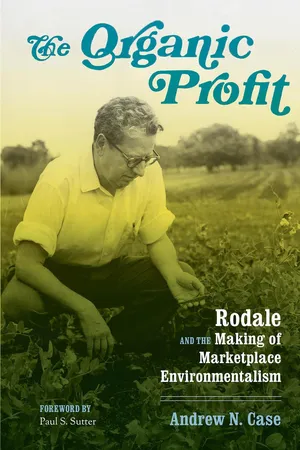![]()
NOTES
INTRODUCTION: BACK TO THE GARDEN, THROUGH THE MARKET
1 This sales number comes from Michael Kaplan, “Rodale’s New Attitude,” Folio, November 2000, 57. As a privately held firm, Rodale is not required to publicly disclose its earnings. Organic Gardening became Organic Life in 2015.
2 On environmentalism in the postwar era see Samuel P. Hays, Beauty, Health, and Permanence: Environmental Politics in the United States, 1955–1985 (New York: Cambridge University Press, 1989); Robert Gottlieb, Forcing the Spring: The Transformation of the American Environmental Movement, rev. ed. (Washington, DC: Island Press, 2005); Adam Rome, The Bulldozer in the Countryside: Suburban Sprawl and the Rise of American Environmentalism (New York: Cambridge University Press, 2001); Rome, “‘Give Earth a Chance’: The Environmental Movement and the Sixties,” Journal of American History 90, no. 2 (2003): 525–54; Adam Rome, The Genius of Earth Day: How a 1970 Teach-In Made the First Green Generation (New York: Hill and Wang, 2013); Jeff Crane and Michael Egan, eds., Natural Protest: Essays on the History of American Environmentalism (New York: Routledge, 2009); Christopher C. Sellers, Crabgrass Crucible: Suburban Nature and the Rise of Environmentalism in Twentieth-Century America (Chapel Hill: University of North Carolina Press, 2012); Andrew Kirk, Counterculture Green: The Whole Earth Catalog and American Environmentalism (Lawrence: University Press of Kansas, 2007); Frank Zelko, Make It a Green Peace! The Rise of Countercultural Environmentalism (New York: Oxford University Press, 2013); James Longhurst, Citizen Environmentalists (Lebanon, NH: University Press of New England, 2012).
3 The concept of marketplace environmentalism draws from scholars who have sought out sites of popular and mass consumer culture as places to analyze social and political change. In particular, Davarian Baldwin’s notion of “marketplace intellectual life” in his work on commerce and ideas in Chicago’s African American community in the interwar years has been critical, and my use of the term marketplace environmentalism is meant to reflect that debt. See Davarian Baldwin, Chicago’s New Negroes: Modernity, the Great Migration, and Black Urban Life (Durham: University of North Carolina Press, 2007).
4 Andrew Szasz, Shopping Our Way to Safety: How We Changed from Protecting the Environment to Protecting Ourselves (Minneapolis: University of Minnesota Press, 2007), 1–8, 134–52; Julia Guthman, Weighing In: Obesity, Food Justice, and the Limits of Capitalism (Berkeley: University of California Press, 2011), 147–62.
5 Lawrence B. Glickman, Buying Power: A History of Consumer Activism in America (Chicago: University of Chicago Press, 2009), 3–6.
6 The best example of this perspective can be seen in James C. Whorton, Crusaders for Fitness: The History of American Health Reformers (Princeton, NJ: Princeton University Press, 1982), 332–39.
7 Michael Pollan, Second Nature: A Gardener’s Education (New York: Dell, 1991), 79–83; Pollan, The Omnivore’s Dilemma: A Natural History of Four Meals (New York: Penguin, 2005), 41–151.
8 For earlier assessments on the history of natural foods see Warren J. Belasco, Appetite for Change: How the Counterculture Took on the Food Industry, 1966–1988 (New York: Pantheon, 1989). The most in-depth history of the organic movement in the United States remains Suzanne Peters, “The Land in Trust: A Social History of the Organic Farming Movement” (PhD diss., McGill University, 1979). An important critique of the history and practice of organic farming can be found in Julie Guthman, Agrarian Dreams: The Paradox of Organic Farming in California (Berkeley: University of California Press, 2004). On organic gardening see David M. Tucker, Kitchen Gardening in America: A History (Ames: Iowa State University Press, 1993). On composting see Barton Blum, “Composting and the Roots of Sustainable Agriculture,” Agricultural History 66, no. 2 (1992): 171–88. More recent works that use parts of the Rodale story include Joshua J. Frye, “The Transnational Origin, Diffusion, and Transformation of ‘Organic’ Agriculture: A Study in Social Movement Framing and Outcomes” (PhD diss., Purdue University, 2007). More popular works that tell parts of the Rodale story include Samuel Fromartz, Organic, Inc.: Natural Foods and How They Grew (Orlando, FL: Harcourt, 2006).
9 Paul Sutter, Driven Wild: How the Fight against Automobiles Launched the Modern Wilderness Movement (Seattle: University of Washington Press, 2002), 10. Important exceptions to this trend come from histories focused on the organic movement both in the United Kingdom and throughout the world. See Philip Conford, The Origins of the Organic Movement (Edinburgh: Floris Books, 2001); Matthew Reed, Rebels for the Soil: The Rise of the Global Organic Food and Farming Movement (Washington, DC: Earthscan, 2010).
10 See Thomas Jundt, Greening the Red, White, and Blue: The Bomb, Big Business, and Consumer Resistance in Postwar America (New York: Oxford University Press, 2014); Robin O’Sullivan, American Organic: A Cultural History of Farming, Gardening, Shopping, and Eating (Lawrence: University Press of Kansas, 2015); Michelle Mart, Pesticides, a Love Story: America’s Enduring Embrace of Dangerous Chemicals (Lawrence: University Press of Kansas, 2015).
11 Jundt, Greening the Red, White, and Blue, 62.
12 O’Sullivan, American Organic, 50.
13 Geoffrey Jones, Profits and Sustainability: A History of Green Entrepreneurship (New York: Oxford University Press, 2017), 3.
14 Adam Rome, “The Ecology of Commerce: Environmental History and the Challenge of Building a Sustainable Economy,” in Green Capitalism? Business and the Environment in the Twentieth Century, ed. Adam Rome and Hartmut Berghoff (Philadelphia: University of Pennsylvania Press, 2017), 10.
15 Christine Meisner Rosen and Christopher C. Sellers, “The Nature of the Firm: Towards an Ecocultural History of Business,” Business History Review 73, no. 4 (1999): 577–600.
16 Ulrich Beck, Ecological Enlightenment: Essays on the Politics of the Risk Society (Atlantic Highlands, NJ: Humanities Press, 1995), 3.
17 My thinking about Rodale’s texts draws from Lawrence Levine’s treatment of popular culture in his seminal essay “The Folklore of Industrial Society,” in that it aims to understand American attitudes through materials in the past that were “widely accessible and widely accessed.” Like Levine, I argue that popular cul...
